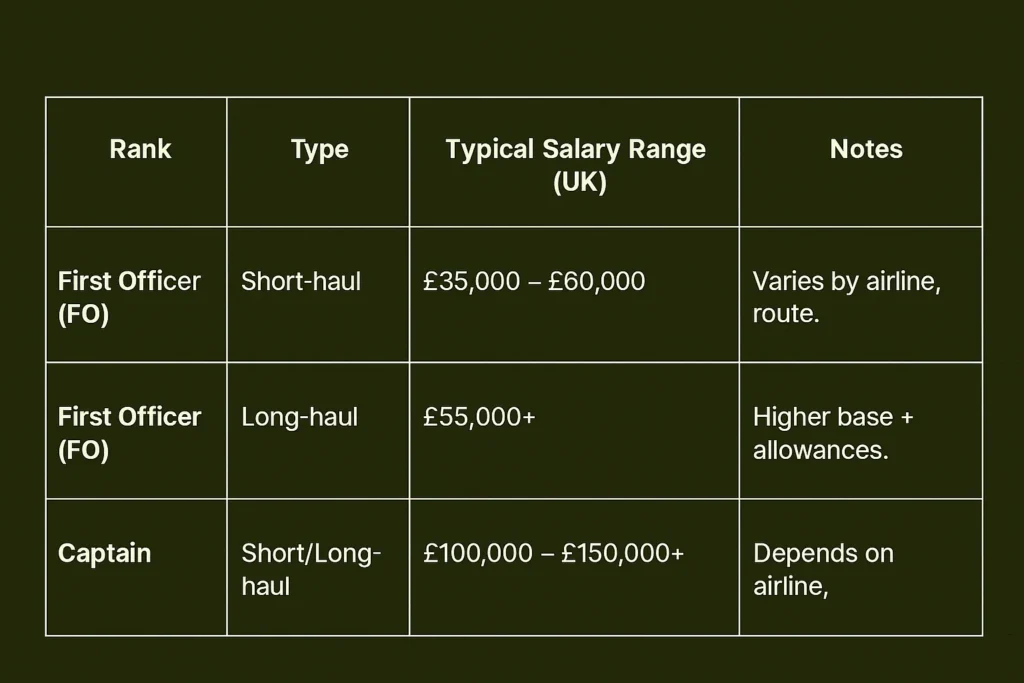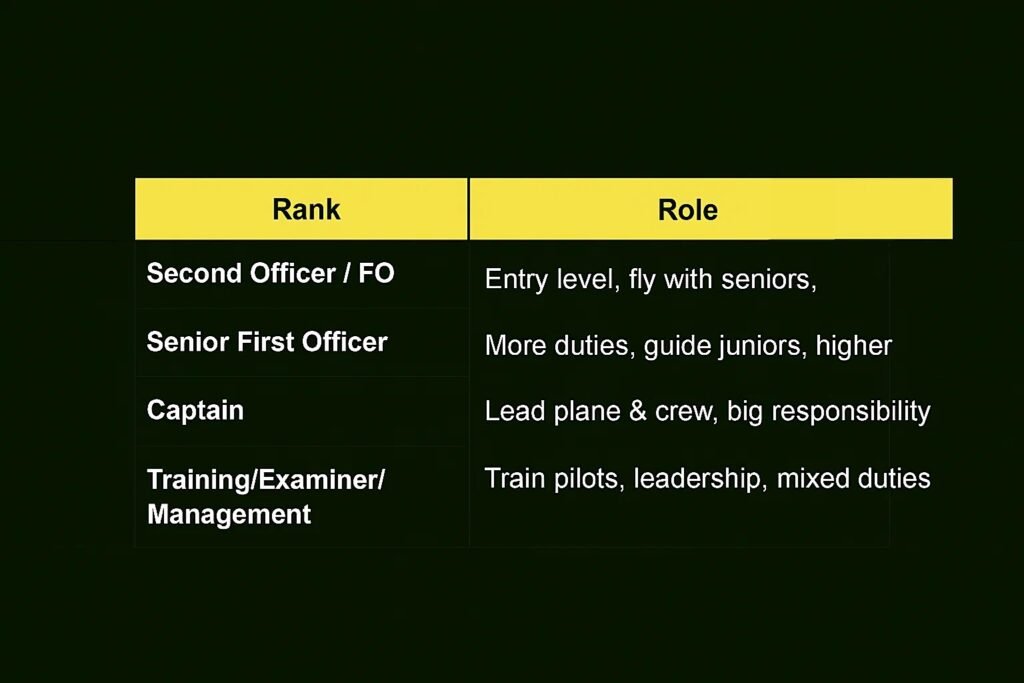No products in the cart.
Dreaming of flying high for a living? You’re not alone. Many people want to know what the pilot salary UK looks like in 2025. On average, airline pilots earn £72,000 to £80,000 a year, while those flying from London can make around £100,000. Pay changes a lot depending on the airline, your rank, and the aircraft you fly.
A pilot’s pay isn’t just one number. It includes basic pay, flight-hour pay, and allowances for meals, night stops, and time away from home. Many airlines also add bonuses for experience or long service.
Flying may seem glamorous — and sometimes it is — but it also takes skill, focus, and real passion. Whether you start as a First Officer or aim to become a Captain, each flight brings new challenges and rewards.
In this article, we explore the pilot salary in the UK in detail. You’ll find out how much pilots earn in 2025, why pay differs by airline and rank, how flight hours and allowances affect total earnings, and what might change in the future. By the end, you’ll have a clear picture of pilot pay in 2025 and what to expect if you’re planning a career in aviation.
What Is the Average Pilot Salary UK in 2025?
So, how much do pilots really earn in 2025? According to Glassdoor UK, the average pilot salary is around £72,262 a year. Meanwhile, data from ERI and Euronews puts the national average a bit higher — at about £78,146. For those flying out of Greater London, it’s even better, with typical pay reaching £100,060.
These figures give a good picture of the market, but remember — pilot pay can vary a lot. Your total earnings depend on the airline, your experience, and even the type of aircraft you fly. Some airlines add flight-hour bonuses or allowances for time away from home, which can boost your income nicely.
It’s clear that becoming a pilot isn’t just exciting — it can also be a well-paid, rewarding career for those who love the skies.
How Much Do Airline Pilots Earn per Year and per Hour in the UK?
Here’s a quick breakdown:
- Annual salary: Around £72,000 on average.
- Block/sector-hour pay: Roughly £80–£96 per hour based on 750–900 hours a year (varies by airline).
- Allowances: Extra for meals, night stops, and time away from home.
- Bonuses: Some airlines reward experience and long service.
These extras sit on top of your basic pay and can make a big difference. Flying isn’t just thrilling — it can also be financially rewarding as your experience grows.
Do Long-Haul Pilots Earn More Than Short-Haul Pilots?
Yes, long-haul pilots usually earn more than short-haul pilots. The extra allowances for meals, overnight stays, and longer duty times can really boost total pay.
Here’s a simple look at typical ranges, based on BALPA data:
- Short-Haul First Officer (A320/B737): Around £35,000–£60,000 per year.
- Long-Haul First Officer: Usually £55,000+ per year.
- Senior Long-Haul Captains at major airlines: Can exceed £100,000 per year.
So, if you love flying long distances, it’s not just about adventure — your pay can reflect the extra responsibility and longer hours. It’s a career that rewards skill, experience, and stamina.
How Does Pilot Salary Change by Airline (BA, easyJet, Ryanair, etc.)?
Pilot pay in the UK can vary a lot depending on the airline. Each company structures salaries differently, combining basic pay, flight-hour pay, and allowances. Here’s a quick snapshot for 2025:
- British Airways: Starting First Officers earn around £78,000 plus about £14,300 in allowances. Senior Captains can reach £115,460 plus £25,100 allowances.
- easyJet: London-based Captains usually have a base of £145,000–£166,000, and some union briefings suggest packages could approach £200,000 in proposals.
- Ryanair: Pay mixes a lower basic salary (~£56,500) with higher sector pay and allowances, depending on base and contract.
So, while flying is thrilling, your earnings really depend on which airline you join. Some airlines give more for experience, while others pay more per flight hour. Choosing the right airline can make a big difference to your earnings and career.
How Do Rank and Experience Affect Pilot Pay (FO vs Captain)?

What Allowances Increase Pilot Salary (Night-stops, Per Diem, Sectors)?
A pilot’s pay isn’t just the basic salary. Several allowances can make a big difference, especially if you fly long hours or overnight. Here’s a simple guide:
- Sector Pay: Extra money for every flight you complete.
- Per Diem / Night-Stop: Covers meals and hotel stays when you are away from home.
- Duty / Irregular Hours: Extra pay for long or unusual working hours.
These allowances are added on top of your basic salary. Pilots who fly a lot or do many overnight trips can earn tens of thousands more each year. In short, the more you fly, the more exciting and rewarding your pay can be.
Do London-Based Pilots Earn More Than Regional-Based Pilots?
Yes, pilots based in London usually earn more than those at regional airports. On average, the UK pilot salary is around £78,000, while Greater London pilots can make about £100,000 a year.
Why the difference? Airlines often add base-specific allowances and rosters. This means London pilots may get extra pay for overnight trips, longer duty hours, or special schedules.
In short, location matters. Being based in London can boost your total earnings and give you more chances for extra pay.
What’s the Starting Salary for Cadet and Newly Qualified Pilots in the UK?
Starting your pilot career is exciting, but what pay can you expect? Most new or cadet pilots earn £35,000–£60,000+ a year.
Pay depends on the airline, aircraft type, and any bonded or contractor scheme. These can change your starting income. Your salary usually rises quickly as you gain flight hours and experience. Some legacy airlines, like British Airways, pay more for direct-entry First Officers — around £78,000 plus allowances.
Early on, it’s about learning and growing. With time and skill, your pay climbs fast as your career takes off.
How Fast Can First Officers Reach Captain Pay in the UK?
Becoming a Captain is a big goal for many pilots, but it takes time, skill, and opportunity. The move from First Officer to Captain depends on seniority, available vacancies, and the fleet you fly.
At fast-growing short-haul airlines, the jump can happen in about four to eight years. For long-haul or legacy airlines, it may take longer because promotions depend on base growth and retirements.
There’s no fixed timeline, but every flight brings you closer. With patience, experience, and steady progress, Captain pay and responsibility soon come within reach.
How Do Rosters, Block Hours and Overtime Impact Pilot Earnings?
A pilot’s pay changes with how much and when they fly. The more flights you do, the more you earn.
- More flights or hours: Each flight adds extra pay, so busy rosters mean more money.
- Delays or changes: If flights run late, pilots often get extra duty pay.
- Fixed rosters: These give steady hours and pay but less overtime.
Every airline works a bit differently. But in general, more flying and flexible hours can help you earn more and build experience faster.
What Bonuses or Profit-Share Can UK Pilots Receive?
Many UK airlines offer bonuses or profit-share schemes, especially in good financial years. These rewards can make a nice difference to your total pay.
Bonuses are not guaranteed, but when paid, they can add several thousand pounds to a pilot’s yearly income. The amount depends on how well the airline performs and what’s agreed in that year’s plan.
Each airline has its own system, so it’s always best to check company updates or crew portals for the latest details. When things go well, these extra rewards make the job feel even more satisfying.
How Does Contract Type (Permanent vs Contract) Change Pilot Pay?
Pilot pay can look different depending on the type of contract you have. Both options have pros and cons.
- Permanent pilots get steady pay, paid holidays, a pension, and sick leave. Their rosters are usually more stable, too.
- Contract or self-employed pilots often earn higher daily or flight rates, but they don’t get the same benefits. Their income can change month to month.
So, while contract pilots might earn more in busy seasons, permanent pilots enjoy security and steady benefits all year round. It’s about choosing what matters most — flexibility or stability.
Pilot Salary UK vs Other Countries: Is the UK Competitive?
Pilot pay changes a lot depending on where you fly. Let’s look at how the UK compares with other countries.
- UK pilots earn around £72,000–£80,000 a year on average.
- US airline pilots earn a median salary of about $226,600 (May 2024), according to the Bureau of Labour Statistics.
- European pilots earn mixed pay — some countries pay less than the UK, while others pay slightly more, depending on airline and base.
So, what does this mean?
- The UK offers steady, reliable pay with good benefits and strong working conditions.
- The US offers higher cash pay, but the job market is tougher and more competitive.
- Europe sits in between, with a wide range of salaries and working setups.
Overall, UK pilot pay stays solid and respected, even if it’s a bit lower than the top-paying markets.
What Deductions Matter for Take-Home (Tax, Pension, Union, Type Ratings)?
Your pilot payslip can look busy, but don’t worry — it’s easier than it seems once you know what’s what. Your take-home pay is simply what’s left after all the usual deductions.
Here’s what’s usually taken out:
- Income tax and National Insurance (NI): These are standard for everyone working in the UK.
- Pension contributions: If you’re in a company pension scheme, a small part of your salary goes towards your future savings.
- Union dues: If you’re part of BALPA or another union, you’ll see this as a monthly fee on your payslip.
- Type rating bond or loan deductions: Some pilots repay training costs this way, especially when starting out.
It’s a good idea to use a UK net pay calculator to see what you’d really take home. Just add your basic pay and average allowances — it gives a clearer picture of your monthly income after deductions.
It might feel like a lot comes off, but remember — those deductions also help secure your career, protection, and long-term benefits.
Do Type Ratings or Additional Qualifications Boost Pilot Pay?
Yes, they do. Having a type rating or extra skills can help pilots earn more money.
Airlines often pay higher rates for pilots who already know how to fly certain aircraft. It saves the company training costs, so they reward those pilots.
As pilots gain more experience, their pay can grow too:
- Becoming a Captain gives a big pay rise.
- Working as a Trainer or Examiner brings extra income.
- Flying long-haul or wide-body planes usually pays more than short-haul routes.
Each new skill or rating can make a real difference to your earnings and open new flying opportunities.
What Is the Career Progression and Top Pay for UK Pilots?
Becoming a pilot in the UK is an exciting journey. You start small, learn step by step, and grow as you gain more flying hours. Each stage brings new skills, more respect, and better pay.
Here’s a simple look at how a pilot’s career grows:

Now, let’s talk about pay:
- Top UK Captains can earn over £150,000 a year.
- Some short-haul Captains at high-paying airlines make £160,000+ before extras.
- Many also get bonuses, travel perks, and allowances.
In short, being a pilot is a career full of growth. The more you fly, the more you earn — and the higher you go in your career.
FAQs
- How much does a Ryanair pilot earn in the UK?
A pilot at Ryanair in the UK can expect to earn between £41,000 and £88,000 per year in total. This amount includes both the basic salary and extra pay, such as flight allowances and bonuses.
- How much do Jet 2 pilots earn?
Pilots at Jet2.com and Jet2holidays earn an average base salary of around £78,000 a year. They also get extra pay of about £13,000 a year, which can include bonuses, profit sharing, or other rewards.
- Is a pilot a stressful job?
Yes, being a pilot can be stressful at times. Pilots have a lot of responsibility for passengers and safety.
- Is a pilot a millionaire?
Some airline pilots can become millionaires during their careers. They earn high salaries, especially at major airlines.
- What is the survival rate of pilots?
Out of 280 pilots involved in air accidents, about 52% survived and 48% sadly lost their lives. The survival rate depends on the type of accident and safety conditions.
Final Thoughts: What to Expect from a Pilot Salary in the UK
Pilot pay in the UK depends on a few things — like the airline, base, aircraft type, and rank. On average, pilots earn around £72,000 to £80,000 a year. Captains at big airlines in London can make even more. Extra pay also comes from allowances and flight hours, which can change from month to month. So, two pilots may earn different amounts even in the same company.
If you want to know the latest pay, check airline job ads, such as on the British Airways Careers website. They show the most accurate and up-to-date information. In short, being a pilot in the UK can pay very well. With experience and passion, your income — and your career — can rise higher and higher.
While pilot salaries can be very rewarding, not everyone wants to spend years training in the cockpit. A great way to begin a career in aviation is by working in cabin crew—gaining travel perks, customer service skills, and a clear route into the airline industry. If that excites you, our Diploma in Air Cabin Crew is the perfect place to start.







